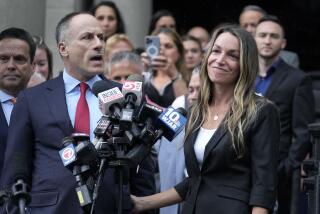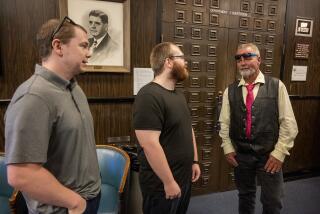Haun Verdict May Affect Dally’s Fate
Their lives were entwined--unquestionably in romance and allegedly in murder.
But now that Diana Haun’s fate rests in the hands of a jury, legal experts say the outcome of her murder trial could set her and longtime lover Michael Dally on opposite paths.
When Dally, a 37-year-old grocery clerk, goes on trial on charges of murder and conspiracy in the slaying of his wife, Sherri, he could see Haun called as a witness to testify against him, said retired attorney George Eskin, a former prosecutor and defense lawyer.
“There are so many options that could occur here,” Eskin said.
If she is acquitted of all charges, Haun would no longer be protected by 5th Amendment rights against self-incrimination, and prosecutors could force her to testify against Dally, he said.
And if Haun is convicted of all counts and exposed to a possible death sentence, prosecutors might be willing to waive the penalty phase of the trial and guarantee her a prison sentence of life without parole if she agrees to testify against Dally, Eskin said.
“It gets pretty tricky here, because is she going to cooperate if she’s acquitted?” Eskin said. “Her attorney’s state of mind is to blame Dally for orchestrating the whole thing, but we don’t know if that’s her state of mind.”
For six weeks, jurors in Haun’s murder trial listened to testimony about the adulterous two-year affair that she and Dally flaunted to his wife, Sherri. Prosecutors say the lovers eventually tired of the love triangle and decided to take Sherri out of the picture.
They plotted an elaborate murder scheme to kidnap Sherri Dally while she was shopping, stab her and dump her body in a remote area where it would never be found, prosecutors told the jury. But the plan hit a snag, they say, when a search party found the body 26 days later.
Throughout the criminal investigation and even after they were arrested, Dally and Haun continued their love affair. But that may have begun to crumble when Haun shared a jail cell with a prostitute this year and learned that Dally had slept with several prostitutes behind her back, according to court testimony.
Her lawyers told the jury in closing arguments last week that Haun was betrayed, set up and used by Michael Dally. They charged that he was the mastermind of the killing and that Haun had no knowledge of his sinister plans.
Whether she would testify to those allegations during his trial remains a question.
“She doesn’t have to agree to be interviewed [before the trial] by the district attorney investigators, and I wonder if they’d put her on the stand without finding out what she would say,” Eskin said.
*
If the jury convicts Haun of first-degree murder and at least one of the special circumstances alleged in the case, Haun would face either a death sentence or life in prison without the possibility of parole, said Professor Erwin Chemerinsky of the USC School of Law.
The special circumstances charges--leveled against both Dally and Haun--are that the defendants killed Sherri Dally for financial gain and while lying in wait.
Since the allegations--if found to be true--would make their client eligible for the death penalty, Haun’s defense attorneys argued at length on the subject during closing arguments.
On the allegation of financial gain, Deputy Public Defender Neil Quinn told the jury that Haun was not motivated by money and would not necessarily have profited from Sherri Dally’s death.
*
But prosecutors say Michael Dally and Haun killed Sherri, in part, to collect on a $50,000 life insurance policy and about $4,000 worth of retirement funds.
But the jury does not have to find that Haun personally would have profited by killing Dally for the allegation to be found true, according to jury instructions.
The law states only that the defendant “believed the death of the victim would result in the desired financial gain,” either for herself or someone else.
Legal instructions on the allegation of lying in wait are more complicated. Lying in wait is defined as “waiting and watching for an opportune time to act, together with a concealment by ambush or some other secret design to take the other person by surprise,” according to the state’s jury instructions.
In addressing the subject in his closing argument last week, Quinn likened a lying-in-wait scenario to a movie western in which the bad guy hides behind a rock and pops out to gun down an unsuspecting victim.
But the circumstance cannot be found true if there is a “clear interruption” separating the period of lying in wait from the period during which the killing takes place, Quinn stressed to the jury.
*
It is that subtle nuance in the law that makes the circumstance not applicable in Haun’s trial, Quinn argues, because no one knows whether an interruption occurred before Sherri Dally was slain.
The 35-year-old homemaker was abducted the morning of May 6, 1996, and seen by witnesses getting into the back seat of a teal-colored car driven by a blond woman, according to court testimony. She was handcuffed, and after the car was driven away, no one saw Dally alive again.
When the car, which had been rented by Haun, was recovered, Dally’s blood was found soaked into the seat and floorboard. It was also splattered in the back seat and pooled on the door handle, according to court testimony.
Prosecutors argue that based on that evidence, it is reasonable to presume that Dally was fatally stabbed within moments of getting into the car. Such an “uninterrupted attack,” they say, meets the letter of the law.
Whatever the outcome of Haun’s trial, legal experts say it won’t necessarily provide a preview of Dally’s fate. His trial is expected to begin a few months after his lover’s concludes.
Despite the fact that both defendants face conspiracy charges, for instance, the verdicts on conspiracy in the Haun and Dally trials may not match, said Laurie Levenson, associate dean and professor at Loyola Law School.
“There can be straight acquittals [for Haun] and he can be convicted across the board, and both verdicts stand,” Levenson said.
“But if there’s an acquittal on her conspiracy charge, then the prosecutors will have a difficult time getting a conspiracy on him because you need at least two people to form a conspiracy,” Levenson said.
*
Levenson also noted that Haun’s trial will leave Dally’s attorney, James Farley, at a disadvantage--particularly because he was tied up with other cases and unable to watch the Haun trial.
“The prosecutors have the advantage of seeing the weaknesses in the case and the strengths,” she said. “The second defense attorney will be able to get a transcript of the first trial, but there’s an advantage to being able to watch the trial, and in knowing more about the jury and how the jury reacts in the case. . . . It’s like a rehearsal, a dry run.”
Asked to predict how long the jury might take to chew over the six weeks worth of testimony and more than 300 exhibits in Haun’s case, Oxnard attorney David Shain declined.
“After Simpson, all things are possible,” he said. “Nobody knows what goes on in an individual jury room, and the dynamics of one jury are often very different from the dynamics of what goes on in another jury room.”
(BEGIN TEXT OF INFOBOX / INFOGRAPHIC)
Key Dates in Dally Murder Case
May 6, 1996--Sherri Dally disappears from the Target parking lot in Ventura. Witnesses later testify before the Ventura County Grand Jury that they saw a woman matching her description get into the back of a blue-green car.
May 18--Diana Haun is arrested in connection with the disappearance but later is released. No charges are filed.
June 1--A search party finds Dally’s remains in a ravine off Canada Larga Road north of Ventura.
June 5--Coroner says Dally was beaten and stabbed to death.
Aug. 1--Haun is arrested on suspicion of killing Dally.
Aug. 16--The grand jury indicts Haun on charges of murder and kidnapping.
Nov. 15--Michael Dally is arrested in connection with his wife’s slaying and is indicted on charges of murder, conspiracy, kidnapping and special-circumstance allegations making him eligible for the death penalty. Haun is re-indicted on the same charges.
Dec. 4--Haun and Dally enter pleas of not guilty.
Dec. 20--The district attorney announces the death penalty will be sought.
April 23, 1997--The grand jury re-indicts the pair after one of the two special-circumstance allegations is dismissed by the judge.
May 1--A hearing on change of venue begins as defense attorneys argue that Dally and Haun cannot get a fair trial in Ventura County because of pretrial publicity.
May 30--The judge rules a jury from Santa Barbara County should be imported to Ventura County Superior Court to hear the case.
June 17--The judge decides that Dally and Haun should have separate trials.
June 30--Jury selection for Haun’s trial begins in Santa Barbara.
July 30--A dozen jurors and six alternates are selected for the trial.
Aug. 4--Opening statements are scheduled to begin.
Sept. 17-19-Closing arguments in the trial.
Sept. 19--Case goes to the jury.
More to Read
Sign up for Essential California
The most important California stories and recommendations in your inbox every morning.
You may occasionally receive promotional content from the Los Angeles Times.










